Traditional Balsa Sailing Rafts of Playas,
Ecuador
"I did not read anything last Friday because I was in Ecuador again.
Have balsa photos and dimensions for you. Went for a sail with fisherman
Umberto Mite who's been making balsas and fishing on them for 40 years.
It was delightful! Hasta pronto, Kathleen", wrote my friend Kathleen
McKee.
She took these photos on January 15th, 2001.
click on the photos to see higher (~100k jpg) resolution versions.
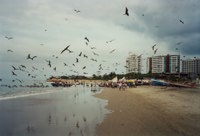
At Playas, Ecuador, by the town of Villamil. Most of the fishermen use outboard
skiffs. At the north end of the beach they use the traditional sailing balsas.
A cloud of frigate birds greet some returning fishermen.
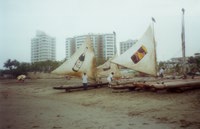
Advertising on the sails. Banner ads!
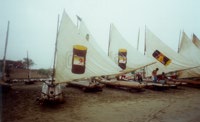
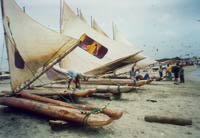
Gunter rigs with two fixed forestays and two running backstays. In some
of these photos you'll see both backstays fast to the ends of the rear crossbeam,
in most you'll just see one at a time.
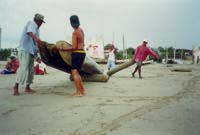
Moving a raft with log rollers.
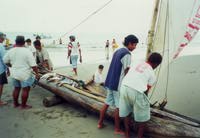
Moving a fully loaded raft. The daggerboard and extra steering oar are
still on board.
.
Foulweather gear made from plastic bags with arm holes. January is in the
rainy part of the southern summer.
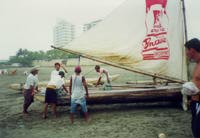
Above the high tide.
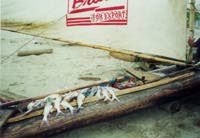
He catches about us$15 worth of fish a day. That's a lot of money in
Ecuador right now. They just switched to US currency and it's in short supply.
 Building a
new balsa.
Building a
new balsa.
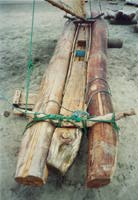
Detail of stern. The rectangular dugout portion of the center log with
the board partition in the middle is called the "bodega". It's
to carry fishing tackle etc.
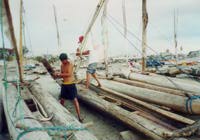
"Just give me ten dollars and I'll take you sailing." Moving
the rig over to the luxury raft. "It's so big and comfortable you'll
go to sleep."

Paddling out. The boy holds the inactive backstay. Notice the lack of
rope wear on the end of the rear crossbeam. This must be a new (or partly
new) raft.
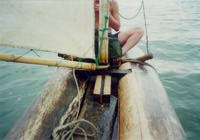
A forked branch fits into the tack end of the boom. This fork rests
against the foot of the mast. The two forestays are steel cable. The rope
in the foreground is the inactive lee running backstay.
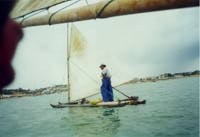
Under way. Umberto said "You can't sail without the steering oar."
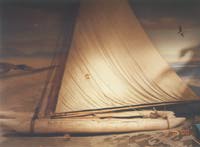
"A modern centerboard raft from Playas Ecuador" says the plaque.
This is on the 2nd floor of the Smithsonian Natural History Museum in Washington
D.C.
It's rigged a little bit wrong. The rig is raked back too much. The boom
is too low. It would hit you when you tacked. The backstays are too slack.
Maybe the mast dried out and shrank, letting forestays slide down the mast
so the mast tilted backward like this. The forestays are tied to the mast
with a "rolling hitch" or "log hitch". Sort of like
a clove hitch.
From: "kathleen mckee"
Subject: Re: balsas on the web
Date: Mon, 09 Apr 2001 12:49:06 -0400
Hey Tim, pics look great!! and your narrations are great and accurate
except
that you should say "Playas has the official name of General Villamil
in the
Southern province of Guayas." and also Don Umberto wanted to charge
me only
$4 for an hour... I decided to pay him $10 for the hour and a half we were
out.
other fact. Each fisherman has a nickname they call each other. Don
Umberto's nickname is La Gata. He fishes from 4am to 1pm with hook and
line, no nets.
I wish I could remember what the fish were called that he caught!
my modest email description:
"... A friend of mine in Boston had asked me (last trip) to get
a book on
how to make a balsa. Yeah right - a book. So I bought a measuring tape
and
measured most of what I could and took lots of pictures. So on the boat
which is very stable we easily jumped off and back on and swam in the warm
shallow ocean. A 9 year old boy came along and we all had a grand time
jumping off, racing and trying to touch the bottom. It started to rain
and
we brought the boat in. It rained and rained a nice warm tropical even
rain. 5 young boys/men ran over to the weathered, experienced, respected
fisherman who had gringos on his boat. To his shouted orders they pulled
and steered the boat onto the beach by rolling it onto tree trunks that
were
scattered on the beach just for this purpose. Drag the boat onto one, roll
the boat, slide another one under the front, roll it, after the boat rolls
off the back roller, drag that one to the front and roll it again. AFter
about 10 repititions and lots of smart comments from our guide don Umberto
(Umberto Mite also known as La Gata) to the "Moreno" (dark negro
boy) who
had spent "too much time drinking coffee" so wasn't there that
morning to
help him get his boat out for fishing at 4am, they finally got the balsa
back amongst the fleet of about 25 balsas. One was being newly constructed
as we watched. It's just 3 balsa tree trunks strapped together with nylon
cord and a bamboo mast with a big canvas sail with a handpainted food
advertisement."
Will get you a scan of the diagram on Wednesday.
kathleen
Copyright 2001 Kathleen McKee and Tim Anderson. Contact one
of us for use of this material.















